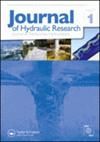Numerical investigation of cavitating flow in centrifugal pump with improved partially-averaged Navier–Stokes method
IF 1.7
3区 工程技术
Q3 ENGINEERING, CIVIL
引用次数: 0
Abstract
AbstractThe objectives of this paper are to pursue an accurate numerical method of unsteady cavitating flow at a reasonable calculation cost and investigate the unsteady cavitating flow characteristics of a centrifugal pump. Firstly, the cavitating flow simulations of a centrifugal pump were performed using the partially-averaged Navier–Stokes (PANS) turbulence model and its improved model to evaluate the numerical methods based on experimental data. Compared with the experimental results, the improved PANS turbulence model can better predict the cavitating flows in the pump and has better applicability. Further, the unsteady cavitating flow characteristics of the centrifugal pump, such as the vapour volume fraction, the cavitation-vortex dynamics and the pressure and head fluctuations, were simulated by improved PANS model and discussed. The liquid flow vortex at the end of the cavitation in the impeller is an important reason for the periodic change of the cavitation shape. The periodic change of cavity volume has a certain impact on the pressure pulsation in the impeller and the pump head.Keywords: Cavitating flowcavitation modelcentrifugal pumpturbulence modelvortex Disclosure statementNo potential conflict of interest was reported by the author(s).Additional informationFundingThis work was supported by the National Natural Science Foundation of China [grant number 51979126].改进的部分平均Navier-Stokes法对离心泵内空化流动的数值研究
摘要本文的目的是在合理的计算成本下,寻求一种精确的非定常空化流动数值计算方法,研究离心泵的非定常空化流动特性。首先,采用部分平均Navier-Stokes (PANS)湍流模型及其改进模型对离心泵的空化流动进行了模拟,以验证基于实验数据的数值方法。与实验结果相比,改进的PANS湍流模型能更好地预测泵内的空化流动,具有更好的适用性。在此基础上,利用改进的PANS模型模拟了离心泵的非定常空化流动特性,包括汽体分数、空化涡动力学以及压力和扬程波动。叶轮内空化末端的液体流动涡是造成空化形状周期性变化的重要原因。腔体体积的周期性变化对叶轮和泵扬程内的压力脉动有一定的影响。关键词:空化流动空化模型离心泵湍流模型涡旋披露声明作者未报告潜在利益冲突。本研究得到国家自然科学基金资助[批准号:51979126]。
本文章由计算机程序翻译,如有差异,请以英文原文为准。
求助全文
约1分钟内获得全文
求助全文
来源期刊

Journal of Hydraulic Research
工程技术-工程:土木
CiteScore
4.90
自引率
4.30%
发文量
55
审稿时长
6.6 months
期刊介绍:
The Journal of Hydraulic Research (JHR) is the flagship journal of the International Association for Hydro-Environment Engineering and Research (IAHR). It publishes research papers in theoretical, experimental and computational hydraulics and fluid mechanics, particularly relating to rivers, lakes, estuaries, coasts, constructed waterways, and some internal flows such as pipe flows. To reflect current tendencies in water research, outcomes of interdisciplinary hydro-environment studies with a strong fluid mechanical component are especially invited. Although the preference is given to the fundamental issues, the papers focusing on important unconventional or emerging applications of broad interest are also welcome.
 求助内容:
求助内容: 应助结果提醒方式:
应助结果提醒方式:


